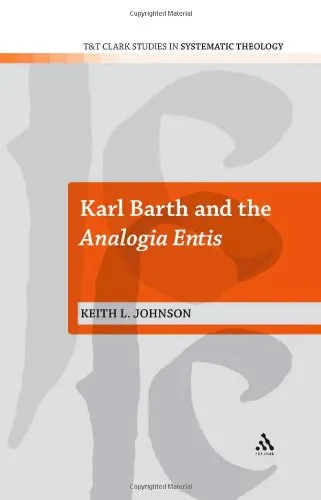Karl Barth and the Analogia Entis (T&T Clark Studies in Systematic Theology)
4.5
Reviews from our users

You Can Ask your questions from this book's AI after Login
Each download or ask from book AI costs 2 points. To earn more free points, please visit the Points Guide Page and complete some valuable actions.Introduction to "Karl Barth and the Analogia Entis"
"Karl Barth and the Analogia Entis" is a pivotal contribution to the field of systematic theology, shedding fresh light on one of the most significant theological debates of the 20th century. Written by Keith L. Johnson, the book addresses the complex relationship between the thought of Karl Barth—one of the most influential theologians of modern Christianity—and the concept of the analogia entis, a philosophical and theological framework championed by Roman Catholic thinkers such as Erich Przywara.
At its core, the analogia entis (the analogy of being) concerns the relationship between God and humanity, focusing on the idea that human beings, as created beings, have an intrinsic similarity to God. Barth, however, expressed vehement opposition to this concept, viewing it as an obstacle to understanding divine revelation and a potential pathway to theological compromise. In this book, Johnson offers a nuanced exploration of Barth’s critique of analogia entis while also presenting a balanced and comprehensive examination of the dialogue between Protestantism and Roman Catholicism on this topic.
Combining historical inquiry, theological analysis, and philosophical engagement, "Karl Barth and the Analogia Entis" is not just a study of theological history—it is a book about how human beings think about God and approach the divine mystery. Whether you are a seasoned theologian or someone intrigued by the intersections of philosophy, theology, and history, this book offers profound insights into the heart of Christian systematic theology.
Detailed Summary of the Book
The book begins by outlining the origins and theoretical framework of the analogia entis as articulated by Roman Catholic thinkers. Erich Przywara’s seminal contributions provide the foundation for understanding how this concept seeks to balance the idea of transcendence with immanence, portraying God’s relationship to humanity as mediated through creation itself.
Keith L. Johnson then moves to Karl Barth’s perspective, delving into Barth’s vehement rejection of the analogia entis. Barth famously called it "the invention of the Antichrist," a phrase that underscores his belief that it misrepresents the biblical understanding of God’s self-revelation. Barth insists that divine revelation must be rooted in God’s own initiative, not in any human ability to analogize God based on creation.
The book proceeds to explore the implications of this disagreement for Christian unity, particularly the Protestant-Catholic dialogue. Johnson engages with works from both traditions, showing how theological partnerships might be forged despite fundamental disagreements. He emphasizes that dialogue between Barthian theology and analogia entis proponents cannot be ignored if Christians hope to achieve greater understanding across denominational lines.
Johnson concludes the book with reflections on the broader significance of this debate for contemporary theology, encouraging theologians and Christian leaders to wrestle with the theological questions of God's revelation, transcendence, and relationship to humanity with humility and academic rigor.
Key Takeaways
- Karl Barth’s critique of the analogia entis highlights the importance of divine revelation over human philosophical constructs.
- The analogia entis provides a fascinating lens for understanding human participation in God’s creation.
- The Protestant-Catholic divide over this issue has profound implications for ecumenical dialogue.
- The book invites readers to grapple with fundamental questions about the nature of God and the limits of theological discourse.
Famous Quotes from the Book
"Divine revelation does not require analogies we construct; it challenges the very construction of those analogies."
"To dwell only on our ability to reason toward God is to risk ignoring God’s movement toward humanity."
"The dialectical tension between Barth and analogia entis thinkers reminds us that theology cannot escape the mystery it seeks to describe."
Why This Book Matters
"Karl Barth and the Analogia Entis" is not just about one theologian’s critique of a concept—it is about the question of how Christians understand the relationship between God and humanity. By addressing this key issue through the lens of one of the most important theological debates of the modern era, Keith L. Johnson invites readers to reflect on their own theological assumptions and presuppositions.
This book is vital for anyone seeking to understand the historical and theological roots of Protestant-Catholic dialogue, as well as for those who aspire to grapple with the fundamental nature of God’s revelation. It challenges theologians to critically engage with ideas that continue to shape theological discourse today. Furthermore, its deep exploration of Barth’s thought makes it an indispensable resource for scholars, pastors, and students of systematic theology.
Free Direct Download
You Can Download this book after Login
Accessing books through legal platforms and public libraries not only supports the rights of authors and publishers but also contributes to the sustainability of reading culture. Before downloading, please take a moment to consider these options.
Find this book on other platforms:
WorldCat helps you find books in libraries worldwide.
See ratings, reviews, and discussions on Goodreads.
Find and buy rare or used books on AbeBooks.
1128
بازدید4.5
امتیاز50
نظر98%
رضایتReviews:
4.5
Based on 0 users review
"کیفیت چاپ عالی بود، خیلی راضیام"


